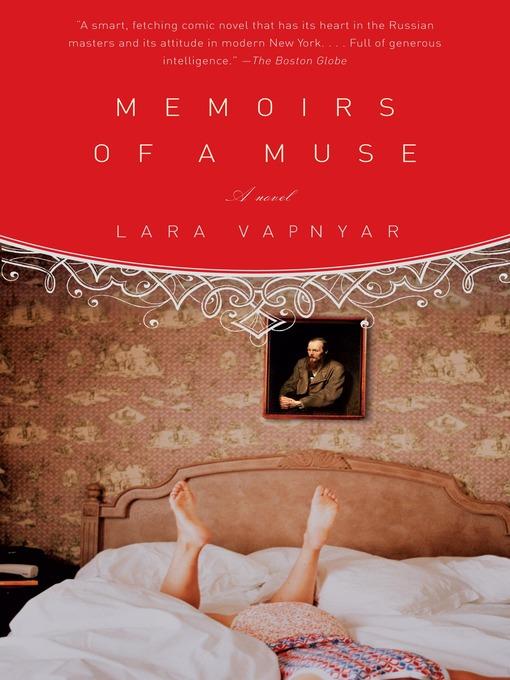
Memoirs of a Muse
Vintage International
- اطلاعات
- نقد و بررسی
- دیدگاه کاربران
نقد و بررسی

Starred review from February 27, 2006
Reviewed by Caryn James
What kind of person writes a thesis about makeup in 19th-century Russia? Tatiana Rumer, a would-be historian from the collapsing Soviet Union, wants to know where people from the past dumped their garbage, "what men used for shaving and what women used for birth control." Her thesis adviser in New York, where Tanya moves after college, sneers. But Tanya's eye for details—especially the cosmetic details that give life a rosier glow—makes her the ideal narrator for Lara Vapnyar's witty, engaging, beautifully precise first novel.
During her Soviet childhood, Tanya is a girl who escapes her unpopularity by dreaming that she will become the muse of a great writer. Her favorite is Dostoyevski, and she chooses as her own inspiration his mistress, Polina, who was immortalized as a character in The Brothers Karamazov
and The Idiot
. Dostoyevski's wife, Anna, to whom he dictated The Gambler
, seems a mere stenographer to Tanya; a muse "influences the great man's work," she believes, in some glorious, "magical way."
Throughout the book, as she moves from her youth in the U.S.S.R. to her first years as a young woman in New York City, Tanya interweaves her own story with that of the affair between Dostoyevski and the actual Polina (Apollinaria Suslova), a story that is a mix of fact and Tanya's romantic fantasies. Only after she joins her émigré aunt and uncle in New York, almost halfway through the book, do we learn that the novel's catchy title is ironic. "Memoirs of a Muse" is the name Tanya gives to her diary about her days as an inspiration—others might say kept woman—of an American writer, Mark Schneider.
The section about their affair becomes more satiric, with its sly portrait of a pretentious, not-quite successful writer in middle age and his navel-gazing Manhattan literary world. Mark's latest novel has the banal title After the Beginning
, but then English is Tanya's second language, so what doe she know?
She learns fast, but Vapnyar learned faster. She writes ridiculously well in English although she only moved to New York from Moscow in 1994, when in her early 20s. Rich with details that simply glide into place, this novel more than fulfills the promise of her 2003 story collection, There Are Jews in My House
. The conclusion reads like a tacked-on epilogue. Otherwise, this is a wonderfully fresh portrait of the romantic imagination and its inevitable collision with reality. (Apr. 4)
Caryn James's second novel,
What Caroline Knew, will be published in March. She is a critic-at-large for the
New York Times.

March 1, 2006
Tanya, a wayward young Russian girl, searches for meaning in Vapnyar -s debut novel (following "There Are Jews in My House: Stories". Her early attempts are charming and evocative: she grouchily orders her sick grandmother about and thinks herself a -tough but efficient nurse. - Later, a male teacher suggests that she -s meant to be a muse to a great writer. Tanya clings to this idea like a woman without any others, and so things begin to fall apart. Besides the somewhat clunky exposition (intermittent scenes of Dostoevsky fumbling with his muse, Apollinaria), it -s just not a very psychologically attractive premise. What it amounts to, anyway, is a kind of giving up. When Tanya finally discovers her fallacy -not quite that muse is a limiting role but that her writer, the ineffectual Mark, considers her not an Apollinaria but an Anna (Dostoevsky -s faithful wife and servant) -most readers will already be two steps ahead of her. The plot, alas, is too thin and too frustratingly predictable to carry the weight of this novel. Despite some lovely writing and stellar supporting characters (particularly Tanya -s smart-talking cousin, Dena), "Memoirs"would probably have worked more successfully as a short story. For larger fiction collections. [See Prepub Alert, "LJ "2/05.]" -Tania Barnes, Library Journal"/EMPHASIS>
Copyright 2006 Library Journal, LLC Used with permission.

February 15, 2006
Vapnyar hasn't lost any of the scintillating precision of her standout short-story collection, " here Are Jews in My House" (2003), in her canny first novel. She even turns up the flame on her delectable wit and sexual candor. As a fatherless girl in Moscow, Tatiana becomes fascinated by the great Russian writers, especially Dostoyevsky. As an adolescent, she is told by a lecherous teacher that she will become "the muse to a great man." When she immigrates to America to pursue a graduate degree in history, she chooses to fulfill her destiny as a muse instead, readily abandoning the stifling immigrant enclave in Brighton Beach for a writer's Central Park apartment. As Vapnyar cleverly dovetails Tatiana's story with that of the woman who reluctantly served as muse to Dostoyevsky, she takes measure of the vast divide that separates men and women, bemoans the failings of feminism, offers a claws-extended parody of the self-obsessed male artist, and delivers a withering critique of the immigrant experience. Writing in an Atwoodesque mode, Vapnyar has fashioned a knowing, irreverent, and toothsome ode to the imagination, a power that all too often leads us astray.(Reprinted with permission of Booklist, copyright 2006, American Library Association.)




دیدگاه کاربران